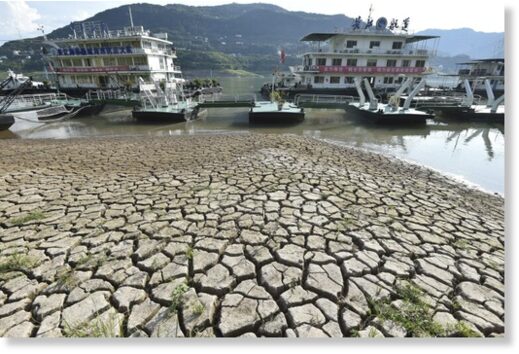
China’s worst heat wave in 60 years forces factories to close as temperatures rise above 40C
(ORDO NEWS) — China’s Sichuan province has ordered the closure of all factories for six days to alleviate power shortages in the region as scorching heat swept through the country.
Sichuan is a key manufacturing site for semiconductors and solar cells, and the power cut will hit factories owned by some of the world’s largest electronics companies, including Apple (AAPL) supplier Foxconn and Intel (INTC).
The province is also the center of China’s lithium production - a key component of electric vehicle batteries - and the power outage could drive up the cost of raw materials, analysts say.
China is experiencing its worst heat wave in six decades, with temperatures in dozens of cities exceeding 40 degrees Celsius.
The heatwave has caused demand for air conditioners in offices and homes to skyrocket, putting strain on the power grid. The drought also led to lower water levels in rivers, which reduced the amount of electricity produced by hydroelectric power plants.
Sichuan, one of China’s largest provinces with a population of 84 million, has ordered 19 of the region’s 21 cities to suspend production at all factories from Monday to Saturday, according to an “urgent notice” issued Sunday by the provincial government and the state power grid.
This decision was made in order to provide enough electricity for domestic needs, the notice says.
The southwestern province, which is also a key hydropower hub in China, has been gripped by extreme heat and drought since July.
Since Aug. 7, the province’s heatwave has intensified to “the most extreme levels in six decades,” with average rainfall down 51% from the same period in previous years, according to an article published on the government’s website on Tuesday.
On Monday, top provincial officials warned that Sichuan is currently facing “the toughest and most extreme moment” in its energy supply, according to the government’s Sichuan Daily.
Luzhou, a city in Sichuan province, announced last week that it will turn off street lights in the city at night to save electricity and reduce strain on the power grid.
Sichuan is rich in mineral resources such as lithium and polysilicon, a key raw material for the solar photovoltaic and electronic industries.
Many international semiconductor companies have factories in Sichuan, including Texas Instruments (TXN), Intel, Onsemi and Foxconn. Chinese lithium battery giant CATL, which supplies batteries to Tesla (TSLA), also has a factory in the region.
Closing factories for a week could cut polysilicon and lithium supply and push prices higher, analysts at Daiwa Capital said in a note to clients.
Several Chinese companies have warned that the power outage in Sichuan could affect their production, including Sichuan Haowu Electromechanical, an auto parts maker, and Sichuan Lutianhua, a fertilizer and chemical products maker.
In addition to Sichuan, other major Chinese provinces including Jiangsu, Anhui and Zhejiang have also urged businesses and households to conserve electricity as the heatwave has depleted electricity supplies.
In some regions, offices have been ordered to increase air-conditioning temperatures to 26 degrees Celsius or turn off elevators on the first three floors to save energy.
Inflation risk
Extreme heat in China also led to crop failures in many parts of the country, adding to inflationary pressures last month.
“Influenced by the constant high temperature in many places, the price of fresh vegetables increased by 12.9% compared to last year, which is significantly higher than the same period in previous years,” said Fu Linghui, a spokesman for the National Bureau of Statistics, at a press release. conference on Monday in Beijing.
He noted that extreme heat has caused drought in some agricultural areas in the south of the country. In the north, rains and floods also led to crop failures.
“August and September are key periods for the formation of autumn grain production. [We must pay close attention to the impact of natural disasters, insects and diseases on food production in our country,” he added.
—
Online:
Contact us: [email protected]
Our Standards, Terms of Use: Standard Terms And Conditions.








